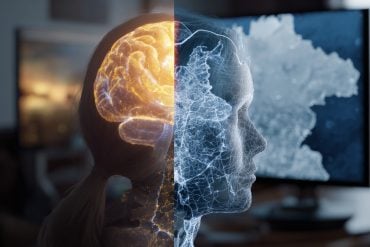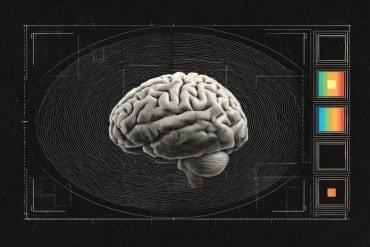Summary: Researchers have identified a novel defense mechanism in the brain that prevents herpesvirus from causing severe brain infections, despite the virus being present in over half the population.
This discovery highlights the protective role of the TMEFF1 gene, which produces a protein that blocks the virus from entering nerve cells. The findings could lead to a better understanding of brain immunity and its role in preventing neurodegenerative diseases like Alzheimer’s.
This research opens new avenues for studying brain defense mechanisms and their implications for brain health.
Key Facts:
- Widespread Infection: Over 50% of people carry chronic herpesvirus, yet serious brain infections are rare.
- Protective Gene: The TMEFF1 gene plays a crucial role in preventing herpes from entering brain cells.
- Implications for Alzheimer’s: Understanding this defense mechanism could shed light on the connection between herpes and Alzheimer’s disease.
Source: Aarhus University
More than half of us are carriers of chronic herpesvirus infections.
But even though the herpesvirus can infect our nerve cells, it rarely causes serious infection of the brain. Researchers from Aarhus University have now discovered a key element of the explanation.
The researchers have discovered a previously unknown defence mechanism in the body that is the reason why herpes infection causes a serious and potentially fatal brain inflammation in only one out of 250,000 cases. The study has recently been published in the scientific journal Nature.

“The study has exciting perspectives because it gives us a better understanding of how the brain defends itself against viral infections,” says Professor Søren Riis Paludan from the Department of Biomedicine at Aarhus University. He is the article’s last author, a Lundbeck Foundation Professor and centre director of the Excellence Centre CiViA.
“We’ve discovered how our body prevents herpesvirus from entering into the brain, even though 50-80% of us are chronically infected with this particular virus. The idea behind CiViA is that we want to understand how the body fights infections without harming itself at the same time. The mechanism we’ve found doesn’t cause inflammatory reactions,” he says.
The answer lies in the protective TMEFF1 gene.
The brain uses a novel mechanism to keep the virus out
Many years of experimenting with the genome-wide CRISPR screening technology and development of mice that lacked the critical gene have finally convinced the researchers that TMEFF1 produces a protein that prevents herpesvirus from entering into nerve cells.
The study in Nature is accompanied by another article describing two patients with brain inflammation caused by herpesvirus infection, called herpes encephalitic. In a collaborative study led by researchers in New York, the research group in Aarhus discovered that two children who developed herpes encephalitis were carrying a genetic defect that disabled the protective TMEFF1 gene.
“The new study is groundbreaking because it updates the basic understanding of immunity against viral infections,” explains Søren Riis Paludan.
“This is interesting for immunologists because it illustrates that there are still many immunological mechanisms in the brain that we don’t know about.
“The study is also relevant for neuroscience because it sheds light on how the brain, so to say, prevents unwanted visitors from intruding without causing harm to the brain itself, i.e. the neuronal cells,” he says.
May provide a better understanding of Alzheimer’s
Søren Riis Paludan hopes that the study is the first step towards revealing a completely new range of brain defence mechanisms. One of the tracks that the researchers will now investigate is what the discovery may mean for the development of dementia.
Research has already demonstrated a correlation between infection with herpesviruses and later development of Alzheimer’s disease.
“Perhaps our discovery of a new antiviral mechanism in the brain can help to clarify whether individual differences in this particular mechanism or similar mechanisms can give the virus access to the brain and accelerate neurodegenerative processes,” says Søren Riis Paludan.
About this genetics and neurology research news
Author: Line Rønn
Source: Aarhus University
Contact: Line Rønn – Aahrus University
Image: The image is credited to Neuroscience News
Original Research: Closed access.
“TMEFF1 is a neuron-specific restriction factor for herpes simplex virus” by Søren Riis Paludan et al. Nature
Abstract
TMEFF1 is a neuron-specific restriction factor for herpes simplex virus
The brain is highly sensitive to damage caused by infection and inflammation. Herpes simplex virus 1 (HSV-1) is a neurotropic virus and the cause of herpes simplex encephalitis. It is unknown whether neuron-specific antiviral factors control virus replication to prevent infection and excessive inflammatory responses, hence protecting the brain.
Here we identify TMEFF1 as an HSV-1 restriction factor using genome-wide CRISPR screening. TMEFF1 is expressed specifically in neurons of the central nervous system and is not regulated by type I interferon, the best-known innate antiviral system controlling virus infections.
Depletion of TMEFF1 in stem-cell-derived human neurons led to elevated viral replication and neuronal death following HSV-1 infection. TMEFF1 blocked the HSV-1 replication cycle at the level of viral entry through interactions with nectin-1 and non-muscle myosin heavy chains IIA and IIB, which are core proteins in virus–cell binding and virus–cell fusion, respectively.
Notably, Tmeff1−/− mice exhibited increased susceptibility to HSV-1 infection in the brain but not in the periphery. Within the brain, elevated viral load was observed specifically in neurons.
Our study identifies TMEFF1 as a neuron-specific restriction factor essential for prevention of HSV-1 replication in the central nervous system.






